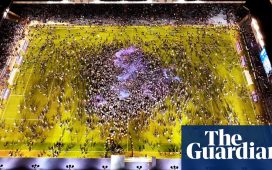The history of River Plate v Boca Juniors games in the Copa Libertadores is long and on Tuesday evening Buenos Aires time they go again in the second leg of this season’s semi-final.
Last year’s twice-postponed Libertadores final was a shambles, a huge embarrassment for Argentina and the Conmebol president, Alejandro Domínguez. On the eve of the scheduled second leg Domínguez had proudly talked up his plans to modernise the competition and make it, if not a rival to the Champions League, then at least a companion for it. The next day the Boca team bus was attacked on the way to the stadium.
Players were traumatised. The captain, Pablo Pérez, had to go to hospital to have glass splinters removed from his eye. Others suffered the effects of inhaling pepper spray. The game was postponed for 24 hours and then called off again, shifted to a different continent so the Libertadores final suffered the symbolic indignity of being played in Madrid.

This season is the first with a one-off final, a showpiece occasion Domínguez believes is more marketable than the two-legged format that had been in use since the competition launched in 1960. What might have happened had Boca and River gone all the way again and caravans of rival fans had set out to traverse Argentina and cross the Andes for the final in Santiago doesn’t bear thinking about. As it is, the two-legged superclásico semi-final is tension enough.
Inevitably, memories of last year have dominated the build-up, particularly given the various conspiracy theories that continue to ask how the attack on the bus could have happened. Few of the questions thrown up last year have been satisfactorily answered.
Why was security so lax? Was the spray that so affected Boca’s players fired by attackers or police? Was the violence related to the arrest of a River ultra a few days earlier? Was it a false flag-attack seeking to have the game abandoned and awarded to Boca as a Libertadores last-16 tie had been awarded to River in 2015, when their players were attacked with pepper spray in the tunnel at La Bombonera?
This year River were at home first and the fact they won that leg 2-0, being denied a more comprehensive victory only by a number of fine saves from the Boca keeper, Esteban Andrada, may dampen excitement a little.

But amid the cauldron of La Bombonera, where there will again be no away fans as a result of the ban imposed in 2013, anything may be possible. For all that River seem the better side it is Boca who lead the table, three points above River, having secured a 0-0 draw at El Monumental in the league.
That said, the River manager, Marcelo Gallardo, has led his side on seven previous occasions at La Bombonera since taking the job in 2014 and has lost only once, 2-0 in May 2015. “We know how to play away games,” Gallardo said. “There are no keys to tight matches. We are intelligent in playing these games and we have players with courage. We are going to suffer, for sure, but we respect our form. We are not going to betray ourselves and that is what I value most in our players.”
Gallardo is a hugely impressive figure, still only 43 but already with a Uruguayan league title with Nacional and two Copa Libertadores with River to his name. It says much for the dysfunction of Argentinian football at national team level that there has not been a more concerted effort to install him as national team manager. Only Carlos Bianchi and Osvaldo Zubeldía have won more than two Libertadores as managers.
If Gallardo can complete the job here and then see off either Grêmio or Flamengo (the first leg between the two, in Porto Alegre, finished 1-1) in the final, not only would it be a striking personal achievement – he would also have taken River, whose historical failures in the Libertadores were once the source of such amusement to opposing fans, to within one of Boca’s total of six successes in the competition.
Boca are not, at the moment, a fluent attacking force. They were poor in a 1-0 home defeat to Racing on Friday, heavily reliant on the Colombian right-sided forward Sebastián Villa for any creative edge. Their 15 games this season have yielded just 16 goals. Only once have they scored more than two and it’s more than two months since they last managed two goals in a game at home.
All logic says that a 2-0 lead should be too much for Boca to overhaul, but logic is often the first casualty of such nights. For Conmebol and Argentinian football as a whole, the biggest result would simply be the night passing off without the need for any postponements.














